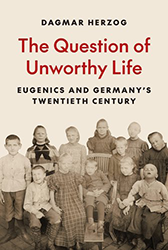A story of resistance, love, and privilege, Paper Bullets highlights the wartime lives of two artists largely lost to time, Lucy Schwob and Suzanne Malherbe. Jeffrey H. Jackson, a professor of history and an expert in modern European history and culture, strives to both recover and question the accepted truth of these women, better known by their professional names, Claude Cahun and Marcel Moore. While Jackson describes their deep involvement in the avante-garde artistic and literary circles in 1920s Paris, the book’s true focus is their self-imposed isolation on the island of Jersey prior to and during World War II. Far from the artistic milieu to which they had once been so central, they must build a new life in a place where their romantic relationship and political affiliations cannot be openly shared. Ultimately, they set themselves up as self-appointed counter-agents to the Nazi forces that settle on the island.
Paper Bullets is enlightening and reads almost like a subtle spy novel: it is enjoyable, intriguing, and suspenseful. In tackling this dual biography, Jackson puts forth a new understanding of Schwob and Malherbe’s personal lives and professional output. Dislodging the traditional narrative that places Schwob as the sole creative force in their duo, Jackson proposes that these women acted as partners and equals, understanding the potential risks and rewards, and sharing in the consequences. This reading not only challenges the prevailing history as it pertains to the war, but also seeks to address the art historical canon. As an aside, Jersey’s role in the war is also something oft overlooked, and benefits from the attention given to it in the book.
Perhaps it is in the light of the past year that it is striking that Jackson does not seem to fully acknowledge the privilege Schwob and Malherbe enjoy, and how that sets them apart from the Jerseyites they encounter more than their artistic and activist activities. The women seem genuinely surprised to learn that others on their adoptive island have also been active in resisting German occupation, as though only they would have the intellectual power or survival instinct. Schwob’s Judaism, seemingly poised to play a pivotal role in their story, is largely overlooked by their German occupiers-turned-captors. Based largely on the womens’ self-reflective writings — some originals from the war years, but many written after the fact to preserve their memories—Paper Bullets incidentally highlights the benefits they were offered because of their wealth, mannerisms, and education, even in the moments when their lives seemed most precarious.
Jackson is a good storyteller, and in Paper Bullets he has picked subjects whose merits deserve to be revisited. He looks past their better-known artistic practice to forefront a time in their lives that has largely been ignored, and reframes how the world might see their relationship to one another. He leaves the formal historical analysis and source material reference for the end of the book, making an exciting and accessible biography that allows the reader to decide how far they will go.
Sophie Olympia Riese is an art collector and curator. She holds a B.A. in History from Brandeis University and an M.S. in Teaching from Fordham University. She lives in New York City.



